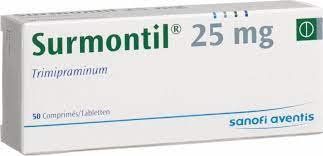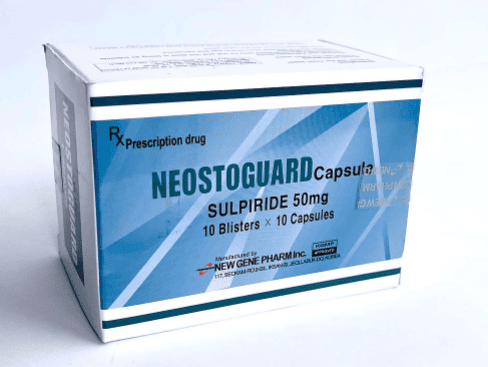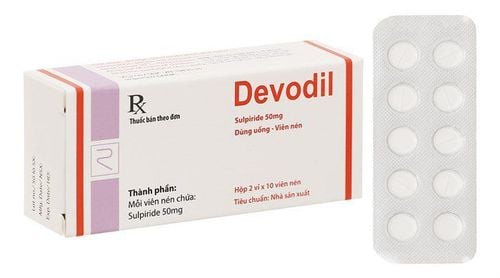This is an automatically translated article.
Risperidone is an antipsychotic active ingredient, commonly used in the treatment of schizophrenia. Risperdal 1mg is a product containing the active ingredient Risperidone. So how to use Risperdal 1mg?
1. What is Risperdal 1mg?
Risperdal 1mg is prepared in the form of film-coated tablets containing the active ingredient Risperidone 1mg. In addition, this product also has other dosage forms such as Risperdal 2mg or oral syrup solution of Risperdal 1mg/ml. Risperidone is a selective monoaminergic antagonist with distinct properties. The active ingredient in Risperdal 1mg has a high affinity for the 5-HT2 receptor of Serotonin and the D2 receptor of Dopamine. At the same time, Risperidone has the ability to bind to alpha1-adrenergic receptors, binds weaker to H1 histamine and alpha2-adrenergic receptors, and has absolutely no affinity for cholinergic receptors.
Risperidone strongly antagonizes Dopamine at the D2 receptor, so it effectively improves the positive symptoms of schizophrenia. In addition, it is less likely to inhibit motor activities or maintain posture compared with other classic neuroleptics. The Dopamine and Serotonin antagonists of Risperdal 1mg when reached equilibrium will reduce the risk of extrapyramidal side effects, and improve the effectiveness of treatment with negative symptoms and affective symptoms. in people with schizophrenia.
2. Indications and contraindications of Risperdal 1mg
Risperdal 1mg is indicated for the treatment of the following diseases:
Psychosis, especially acute and chronic schizophrenia; Short-term treatment of moderate to severe acute manic episodes; Autism with behavioral disorders in children 5-11 years old. In addition, the product Risperdal 1mg is not indicated in the following cases:
Overdose of barbiturates, products containing opiates or alcohol; History of previous allergy to Risperidone or any other ingredient of Risperdal 1mg.
3. Instructions for using Risperdal 1mg
3.1. Dosage Therapeutic dose of Risperdal 1mg in schizophrenia:
Adults: Start with Risperdal 2mg on the first day, then increase to 4mg from the second day. The maintenance dose needs to be adjusted according to the individual patient's response, most of them feel a response to the daily dose of risperidone from 4 to 6 mg; Elderly: Start with Risperdal 1mg 1⁄2 tablets x 2 times/day, then increase to 1-2mg x 2 times/day. Dosage for treatment of acute manic episodes:
Adults: Initially with Risperdal 2mg, once a day, then adjust according to the patient's response. The dose of Risperidone that most people feel better about is 1-6mg taken once a day; Elderly: Initial dose is 1⁄2 Risperdal tablets 1mg x 2 times daily, then gradually adjusted to 1 to 2 mg, 2 times/day depending on the response of the patient. Alzheimer's dementia:
Adults (including the elderly): The starting dose of Risperidone is 0.25 mg twice daily, then adjusted according to individual response. Most patients feel better at 0.5 mg twice daily, with a few requiring Risperdal 1 mg twice daily. It should be noted that the duration of treatment with Risperdal 1mg for Alzheimer's disease should not exceed 6 weeks. Risperdal 1mg is not recommended for use in children and adolescents under 18 years of age. However, in cases of autism with behavioral disorders in children 5-11 years old, it can be used with the following weight-dependent dosage:
Children weighing < 50kg: Initially: 0.25mg x 1 time/day, may be increased by 0.25 mg per day according to treatment response. The usual maintenance dose of Risperidone is 0.25-0.75 mg once daily; Children weighing ≥ 50 kg: Starting dose of 1⁄2 Risperdal tablets 1mg x 1 time/day, can be increased by 0.5mg daily depending on the patient. Maintenance dose from 0.5-1.5mg once a day; The duration of using Risperdal 1mg for children with behavioral disorders does not exceed 6 weeks; Children under 5 years of age should not be treated for behavioral disorders with Risperdal 1mg. 3.2. How to use Risperdal 1mg used orally, divided into 1-2 times / day; Risperdal 1mg can be taken with or without food because food does not affect the extent of gastrointestinal absorption of Risperidone. 3.3. Overdose of Risperdal 1mg and its management Manifestations of Risperidone overdose:
Common signs are drowsiness, neuroleptic, tachycardia, hypotension; Other signs of overdose include prolongation of the QT interval, convulsions, and even cardiac arrest. Treatment of overdose of Risperdal 1mg:
Ensure ventilation and provide adequate oxygen. After that, gastric lavage can be performed (if the patient loses consciousness, need to be intubated first) and use activated charcoal; Impaired consciousness, convulsions or dystonia in the head and neck region in an overdose of Risperdal 1mg increases the risk of aspiration when vomiting is stimulated; Continuous ECG monitoring to detect arrhythmias due to risperidone toxicity. Disopyramid, procainamide and quinidine should not be used in the management of arrhythmias because of the higher risk of QT prolongation due to the synergistic effects of Risperdal 1mg. In addition, the alpha adrenergic blocking effect of Bretylium in addition to the active ingredient risperidone increases the risk of hypotension. Therefore, do not use these drugs to manage arrhythmias caused by Risperdal poisoning 1mg; Risperidone does not have a specific antidote, so most treatment measures are supportive and symptomatic; Treat hypotension and circulatory failure with intravenous fluids and/or use of sympathomimetic agents. However, do not use Epinephrine and Dopamine because beta stimulation will cause more severe hypotension due to alpha blocker effect of Risperidone; In case of Risperdal poisoning 1mg and severe extrapyramidal symptoms, anticholinergic drugs can be used.
4. Some notes when using Risperdal 1mg
The risk of orthostatic hypotension and syncope during the use of Risperdal 1mg can be minimized by adjusting the starting dose to 1 mg twice daily for normal adults, 0.5 mg twice daily for adults. elderly, debilitated, renal failure, liver failure and people at high risk of hypotension; Patients with cardiovascular disease (eg, severe arteriosclerosis, heart failure, conduction disturbances), cerebrovascular disease, or risk factors for hypotension (eg, dehydration, hypovolaemia, use of antihypertensive drugs) and history of seizures, spasticity or Parkinson's syndrome require initiation and maintenance of Risperdal 1 mg lower than usual dose; Risperdal 1mg may cause disturbances in judgment, thinking and motor function. Therefore, patients should not drive or operate machinery until the above undesirable effects have been excluded; Patients with diabetes or at risk of diabetes (such as obesity, family history of diabetes ...) should closely monitor blood glucose when using Risperdal 1mg; Patients with Parkinson's syndrome or dementia receiving antipsychotics (including Risperdal 1mg ) are at increased risk of sensitization to these drugs; Special caution should be taken when administering Risperdal 1mg to people who have experienced convulsions; Caution should be exercised when administering Risperdal to elderly people with dementia 1mg because of the risk of aspiration into the lungs; Risperdal 1mg treatment for children requires weight monitoring; Pregnant and lactating women are not advised to use Risperdal 1mg.
5. Side effects of Risperdal 1mg
Some side effects when taking Risperdal 1mg:
Sleep disturbance, trouble sleeping; Manifestations of Parkinson's syndrome due to Risperdal 1mg such as slow or impaired movement, muscle tightness with other manifestations such as tremor at rest, increased salivation, loss of facial expressions; Headache; Pneumonia, bronchitis ; Signs of the common cold, sinusitis, urinary tract infection; Weight gain, increased appetite; Irritability, depression, anxiety, restlessness; Dizzy .
6. Drug interactions of Risperdal 1mg
Drugs that can reduce the effect of Risperdal 1mg:
Antibiotics Rifampicin; Carbamazepine, Phenytoin or other seizure medicines; Phenobarbital. Drugs that can increase the effect of Risperdal 1mg:
Quinidine; Antidepressants such as Paroxetine, Fluoxetine; Sympathomimetic beta-blockers; Phenothiazines; Cimetidine, ranitidine; Itraconazole and ketoconazole; HIV medications such as ritonavir; Verapamil; Sertraline, Fluvoxamine, other antidepressants and antipsychotics. Risperdal 1mg is a drug commonly used in the treatment of schizophrenia. To ensure effective use and avoid unwanted side effects, patients need to take the drug exactly as directed by the doctor.
Follow Vinmec International General Hospital website to get more health, nutrition and beauty information to protect the health of yourself and your loved ones in your family.
Please dial HOTLINE for more information or register for an appointment HERE. Download MyVinmec app to make appointments faster and to manage your bookings easily.













